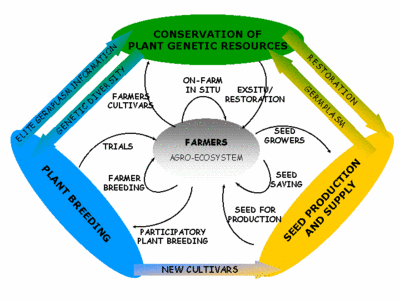Agriculture
National Gene Bank
- 17 Aug 2021
- 4 min read
Why in News
Recently, the Union Minister for Agriculture and Farmers Welfare inaugurated the world’s second-largest refurbished state-of-the-art National Gene Bank at the National Bureau of Plant Genetic Resources (NBPGR).
- Gene Banks are a type of biorepository which preserve genetic material. A collection of seed plants, tissue cultures etc.
- A gene is the basic physical and functional unit of heredity. Genes are made up of Deoxyribonucleic Acid (DNA).
National Bureau of Plant Genetic Resources (NBPGR)
- It is a nodal organisation for management of plant genetic resources in India and functions under the control of Indian Council of Agricultural Research (ICAR).
- It is conserving seed germplasm for long-term conservation (at -20°C) in its National Genebank (NGB).
- It plans, organizes, conducts and coordinates exploration and collection of indigenous and exotic plant genetic resources. It is headquartered in New Delhi and has 10 regional stations.
Key Points
- About:
- The National Gene Bank was established in the year 1996 to preserve the seeds of Plant Genetic Resources (PGR) for future generations, and has the capacity to preserve about one million germplasm in the form of seeds.
- Germplasm is living tissue from which new plants can be grown.
- NBPGR is meeting the need of in-situ and ex-situ germplasm conservation through Delhi Headquarters and 10 regional stations in the country.
- In situ and ex situ conservation focuses on the maintenance of species diversity within or away from their natural habitats, respectively.
- The National Gene Bank was established in the year 1996 to preserve the seeds of Plant Genetic Resources (PGR) for future generations, and has the capacity to preserve about one million germplasm in the form of seeds.
- Significance:
- Presently, it is protecting 4.52 lakh accessions, of which 2.7 lakh are Indian germplasm and the rest have been imported from other countries.
- An accession is a single, collected variety or varieties of a wild plant, a landrace or a plant variety that has been produced by selective breeding, more commonly known as a cultivar.
- Presently, it is protecting 4.52 lakh accessions, of which 2.7 lakh are Indian germplasm and the rest have been imported from other countries.
- Functioning:
- The NGB has four kinds of facilities, namely, Seed Genebank (- 18°C), Cryogenebank (-170°C to -196°C), In vitro Genebank (25°C) and Field Genebank, to cater to long-term as well as medium-term conservation.
- It stores different crop groups such as cereals, millets, medicinal and aromatic plants and narcotics, etc.
- Other Facilities:
- The Svalbard Global Seed Vault in Norway houses the world’s largest collection of seeds.
- India’s seed vault is at Chang La (Ladakh) in the Himalayas.
- National Animal Gene Bank, established at the National Bureau of Animal Genetic Resources (NBAGR - Karnal, Haryana), has the objective of conserving the indigenous livestock biodiversity.
- NBAGR is one of the Indian Council of Agricultural Research (ICAR) institutes.
Plant Genetic Resources
- They are the biological basis of food security and, directly or indirectly, support the livelihoods of every person on Earth.
- They have been defined as the genetic material of plants, which is of value as a resource for present and future generations of people.
- They are any plant materials, such as seeds, fruits, cuttings, pollen, and other organs and tissues from which plants can be grown.
- They have an important role to play to ensure food security. They have been the foundation for the development of agriculture ever since it started 10,000 years ago.







